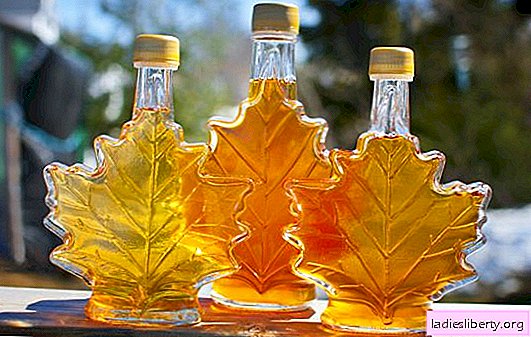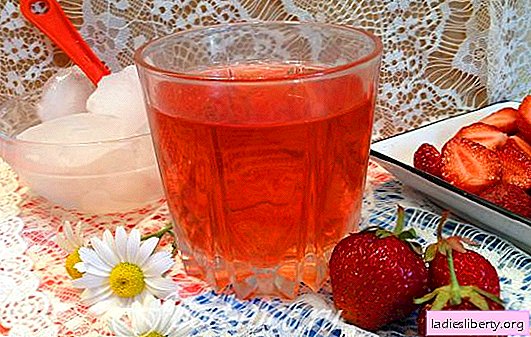
Maple syrup has been used in North America for hundreds of years. This traditional treat is one of the most popular sweeteners. According to some, maple syrup is more nutritious and healthy than sugar or honey. Is it so? Or is it just a PR move for companies releasing their product?
Maple syrup - what is it?
For starters, remember birch sap. In the spring, many villagers drill a hole in the birches and extract this valuable fluid. The American Indians have long been engaged in similar activities, but with maple, or rather, the "sugar" maple, which grows in Canada and the United States from Nova Scotia to northern Texas. And they even called the harvest season (4-6 weeks) the Sugar Moon. In addition, they did not stop at just extracting the juice, but tried to boil the liquid. After evaporating about 40 liters of maple juice, maple syrup is obtained, which is then filtered to remove impurities. To make such manipulations with birch sap will not work, since sugar in it is 10-12 times less than in sugar maple juice.
In short, maple syrup is a concentrate of maple juice. It is a viscous liquid from light to dark amber color. According to these signs, it is divided into several classes.
Maple Syrup Classification
Class A:
· Light amber, has a delicate and soft aroma;
· Mid-amber, produced in the middle of the season;
Class B:
· Dark amber, has a richer flavor.
Class C:
· The darkest color has molasses taste.
A feature of the differences between them is that the dark syrups are made from juice, which is extracted later in the harvest season.
Dark syrups are distinguished by the most saturated maple aroma and are traditionally used in cooking, baking, as well as in the production of sweets and candies, similar to our cockerels. Light varieties are used as regular syrups, for example, for seasoning pancakes, waffles and even ice cream.
The darkest syrup contains minerals and is rich in sugar. A common and main difference from regular, pure sugar is the presence of a certain amount of minerals and antioxidants.
Advice! If you are thinking about purchasing a portion of maple syrup, be sure to make sure that it is a real maple syrup, and not just a maple syrup syrup that may contain refined sugar or corn syrup. Keep syrup in open containers should only be in the refrigerator.
Maple Syrup Composition
100 grams of syrup contain:
· Calcium: 7% of the recommended daily intake;
Potassium: 6%
· Iron: 7%;
Zinc: 28%;
Manganese: 165%.
As you can see, the composition of maple syrup includes a decent number of minerals, especially zinc and manganese. But keep in mind that it also has a lot of sugar. At about 2/3 it consists of sucrose. Therefore, in 100 grams of maple syrup - 67 grams of sugar.
Sugar, in turn, can cause serious harm. If it is used in excess, it can become one of the causes of obesity, type 2 diabetes mellitus and diseases of the cardiovascular system.
Maple Syrup: Pros and Cons
The fact that the syrup contains some minerals is not the best argument in favor of its use due to the high sugar content. A much more healthy and healthy option for the body will be to eat other foods that contain the listed minerals. If a person leads a balanced diet, then the chance of getting a deficiency of any mineral is extremely low.
The glycemic index of maple syrup is about 54, compared with regular sugar, which has a glycemic index of about 65. And if a person still eats sugar-based sweeteners, then replacing sugar with maple syrup in the same amount will reduce the total sugar intake 1/3. This is good from the point of view that maple syrup raises blood sugar more slowly than regular sugar.
As already noted, maple syrup contains a certain amount of minerals, as well as at least 24 different antioxidants. It is known that oxidative processes and effects in cells lead to faster aging, and, consequently, to earlier aging of the body as a whole, as well as to a number of different diseases. The bottom line is that oxidation is an undesirable chemical reaction that involves free radicals - molecules with unstable electrons. Antioxidants neutralize free radicals, thereby reducing oxidation and damage, as well as lowering the potential risk of certain diseases.
Important! Dark maple syrups (class B, C) contain more antioxidants than light ones.
However, the amount of antioxidants still remains small compared to the amount of sugar.
According to studies, replacing all refined sugars in your average diet with “alternative” sweeteners, such as maple syrup, increases your overall antioxidant support. But if a person needs to lose weight or improve his health, then it’s better to completely abandon high-calorie sweeteners, and not stuff yourself with a light version of sugar.
It is curious that some of the beneficial substances are not found in maple, but are formed during boiling and evaporation of juice. One such substance is Quebec, a unique, phenolic compound named after the Canadian province of Quebec, which produces a large amount of maple syrup. Studies have proven that the active ingredients that make up maple syrup help reduce the growth of cancer cells and slow down the breakdown of carbon in the digestive tract. Quebecol is similar to tamoxifen, a medicine used to prevent and treat certain types of breast cancer. Like all pharmaceuticals, tamoxifen carries the risk of serious side effects. Natural Quebecol eliminates them, or acts with fewer side effects.
But, in principle, it should be understood that research remains only research, and does not show what happens to a living person. In addition, most studies are sponsored by maple syrup manufacturers.
There are also opinions that maple syrup may be useful for lush hair and men's health. Ingestion improves the structure and density of the hair, and external use can positively affect dry and split ends, especially for curly hair. For men, elevated levels of zinc in syrup mean a lower risk of prostate cancer and a decrease in the size of this significant gland.
In general, although maple syrup contains some nutrients and antioxidants, it also contains a lot of sugar. In terms of a healthy diet, it is a poor source of wholesome, nutritious substances compared to “real” foods such as vegetables and fruits. Replacing refined sugar with pure, high-quality maple syrup is likely to bring greater health benefits. Although, the expression “less harm than sugar” or a comparison with honey will be more accurate. Which does not make the syrup completely healthy. Use in moderation.











